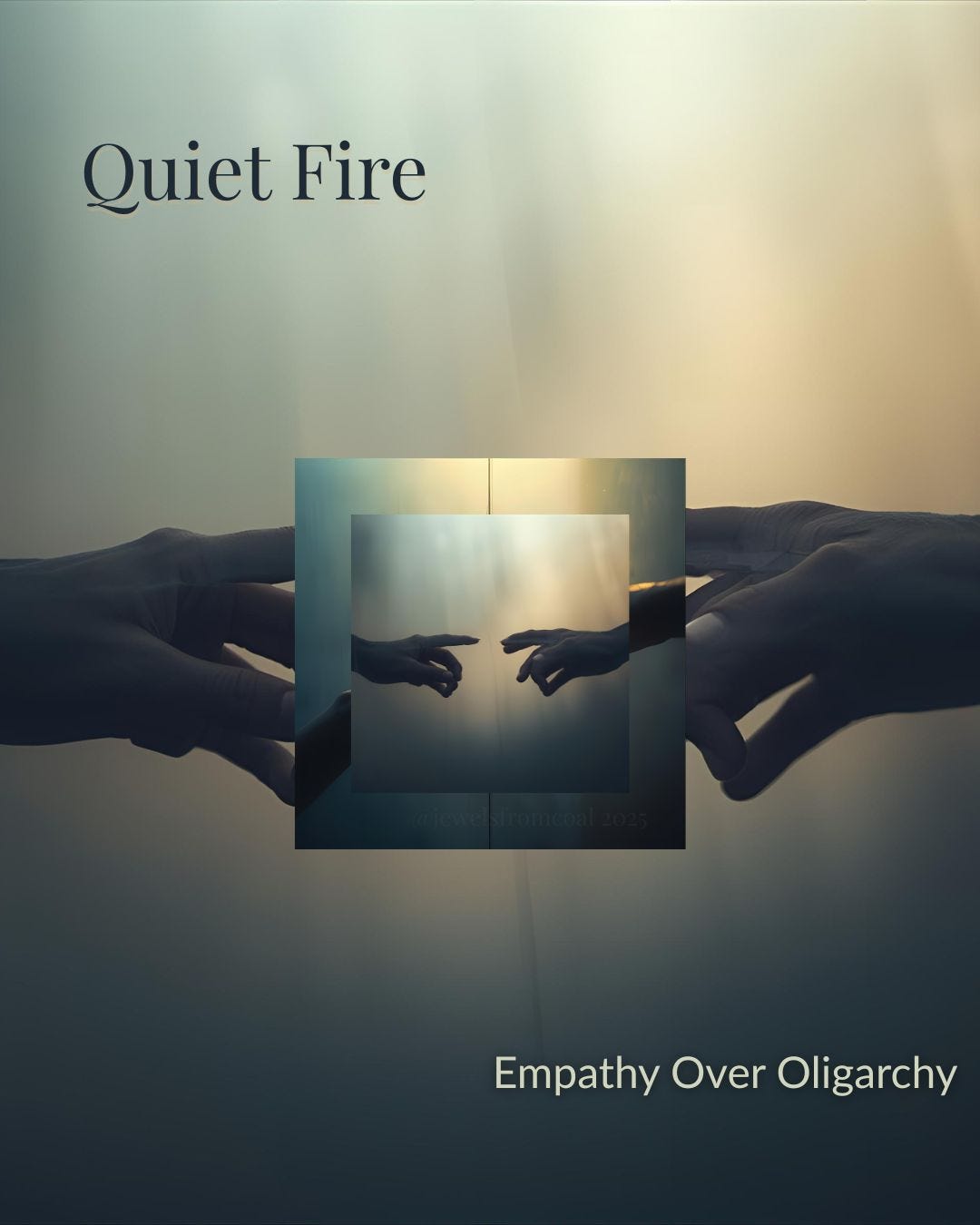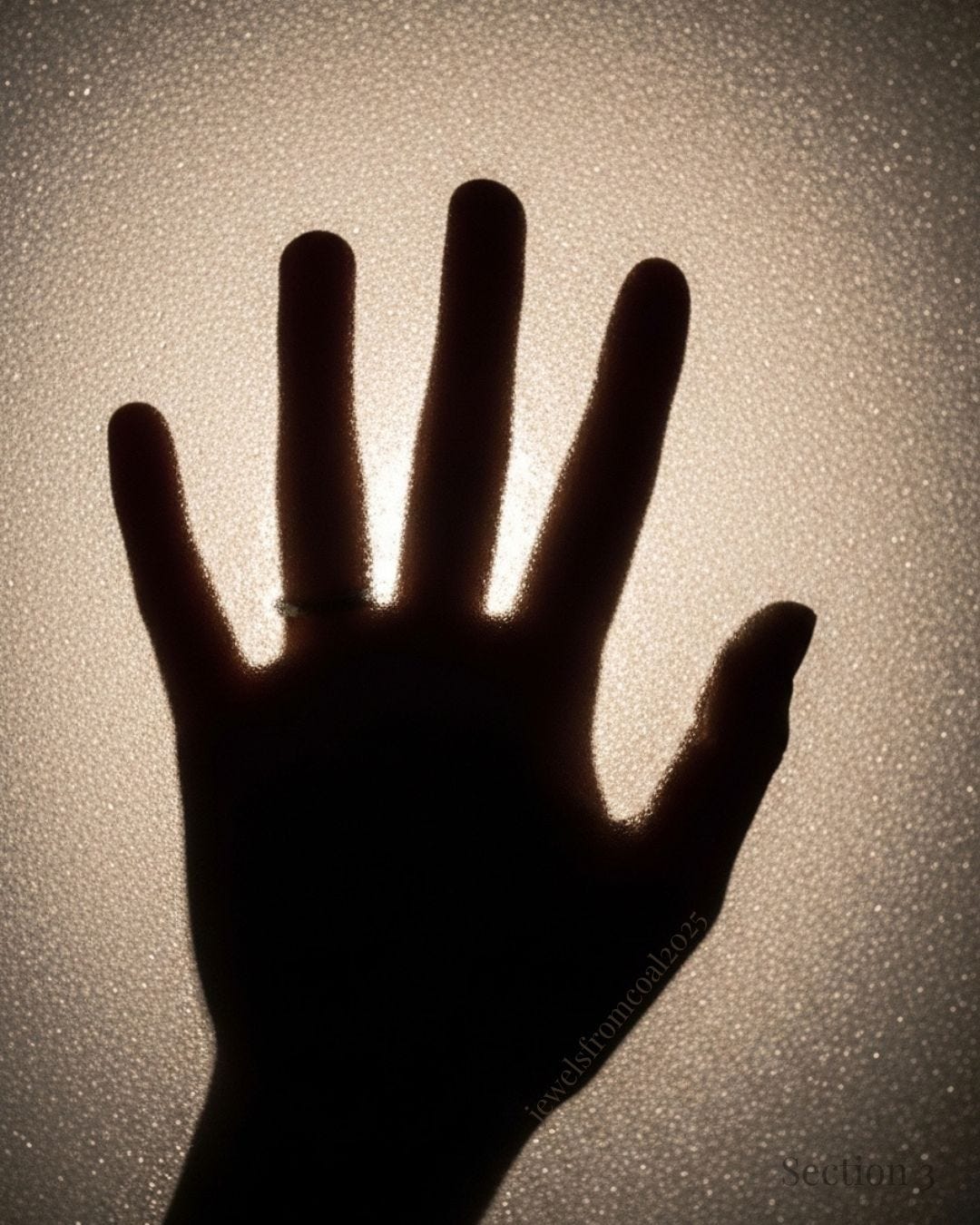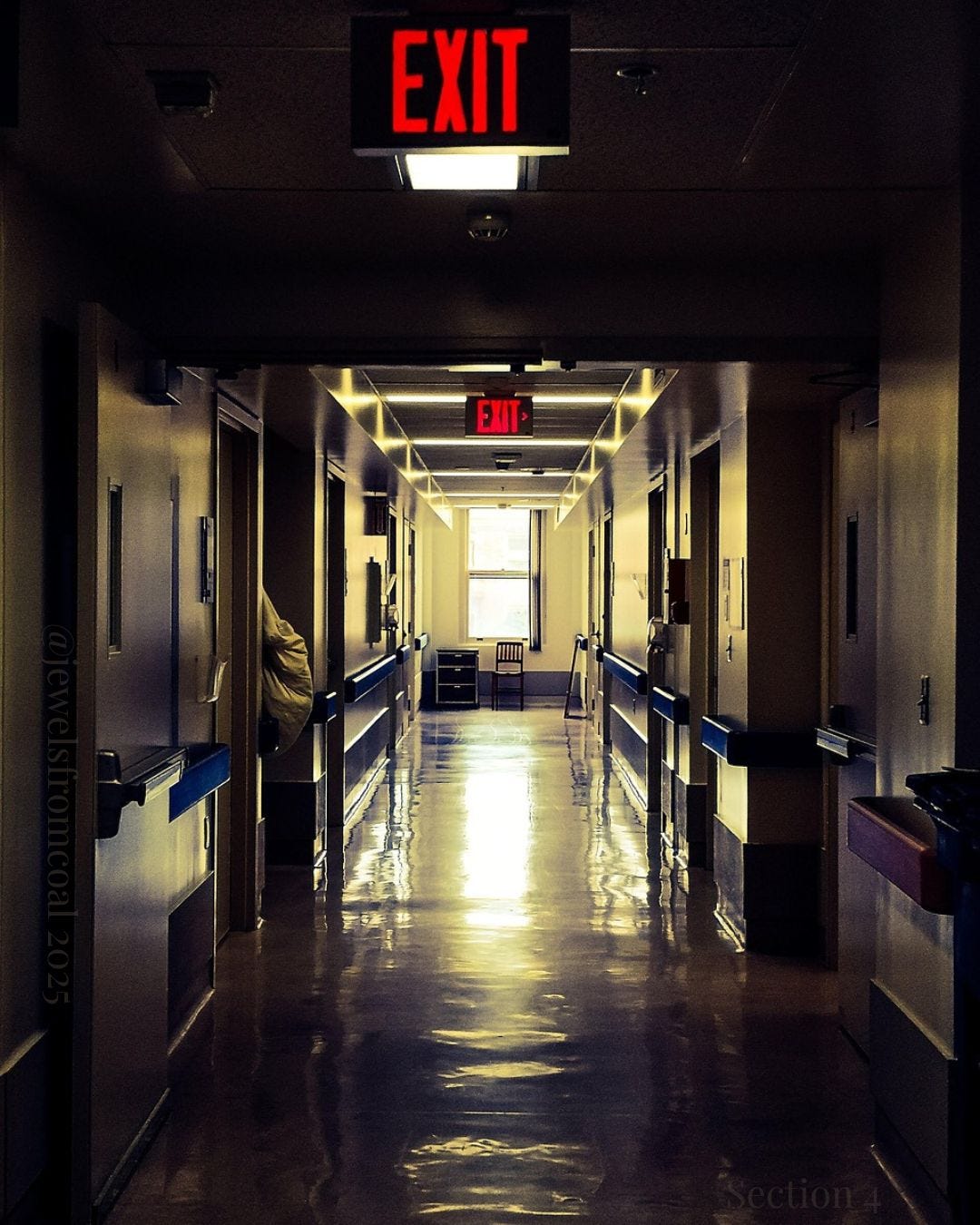Quiet Fire 2
Empathy Over Oligarchy: What Happens When Care Is No Longer a Profession
What does it mean when a government downgrades the professions that hold communities together? And what happens to a nation that treats care work as disposable? In this essay: Social Work, Special Education, economics, crisis, and the quiet rebellion of empathy.
I didn’t expect to wake up this week and find out that the Department of Education released new classification guidance this week that removes Social Work — alongside several other care professions — from its list of recognized professional fields. I shouldn’t have been surprised — every field that centers care, dignity, and community has been under attack for years — but the audacity still hit me in my chest.
Because when they say Social Work is “not a profession,” they’re not talking about paperwork.
They’re talking about people like me.
They’re talking about a field dominated by Black and Brown women, immigrants, disabled folks, queer folks, and working-class people who hold communities together with nothing but training, grit, and a commitment to seeing humanity where systems decide it’s optional. They’re talking about the people who catch others when institutions fail — and institutions fail a lot.
This isn’t a clerical choice.
It’s a cultural one.
A political one.
An economic one.
And it lands exactly where decisions like these always land: on the backs of the very people this country relies on when the bottom falls out.
I think about the two pregnant women turned away from hospitals last week — one forced to give birth in her husband’s truck, and as a parent of four children, I am mortified. I think about the look on a person’s face when they’re denied help, dignity, care — and it haunts me. I think about what it means to walk into a crisis with nothing but your training, your instincts, and your voice — and how easily a Social Worker could have stood in those gaps, advocated, escalated, and refused to let those women be abandoned.
And I think about how convenient it is to declassify the profession that teaches people how to challenge harm the moment harm becomes policy.
I learned early in my life how to read systems — how to see danger, understand power, and hold two truths at once. Some of that came from survival; some came from school; all of it came from care. Social Work didn’t invent my critical lens, but it sharpened it. It gave language to what I already knew: care isn’t passive. Care is disruptive. Care is resistance.
My wife said it best:
“Empathy over Oligarchy.”
And that is what this moment is really about — the attempt to strip legitimacy away from care so that cruelty can move unchallenged.
This Sunday, I want to talk about what happens when a society decides that empathy is optional. And why every one of us should be paying attention.
The Politics of Declassification: Who Gets Targeted and Why
Let’s be honest: the Department of Education didn’t suddenly wake up confused about what a profession is. This is part of a larger pattern, one we’ve seen before — a pattern of shrinking anything that centers care, protection, or collective well-being, especially when those fields are dominated by the people this country has always tried to control or erase.
Look at the list of fields being downgraded.
There’s a theme so loud it doesn’t even need analysis:
Mostly women.
Mostly Black and Brown workers.
Mostly underpaid.
Mostly in care work.
Mostly in positions that require empathy, not domination.
Mostly in roles that challenge systems instead of reinforcing them.
This is not accidental.
It’s not confusion.
It’s strategy.
For generations in this country, the work that holds society together — caregiving, teaching, healing, advocating, supporting — has been treated as lesser. Not because it lacks value, but because it is done by people this nation has historically devalued.
When a field becomes overwhelmingly female, its status drops.
When a field becomes overwhelmingly Black and Brown, its wages drop.
When a field becomes rooted in empathy, its legitimacy is questioned.
And when a field begins to challenge systemic harm, policymakers find new ways to shrink it.
Social Work, Special Education, community health, behavioral support, early childhood education — these are the professions that see the things power would rather keep hidden:
abuse
neglect
discrimination
exploitation
underfunded institutions
harmful policies
racial disparities
economic violence
These are the professions that can say, “This is unacceptable,” and know how to document it.
They know how to escalate.
They know how to advocate.
They know how to make the harm visible.
That is the real threat.
Because an oligarchic mindset — whether governmental or cultural — requires two things to operate smoothly:
Workers who don’t ask questions.
Communities who don’t have advocates.
Social Workers do the opposite.
They ask too many questions, see too much, and refuse to look away.
So of course the professions being declassified aren’t hedge fund managers, real estate investors, law enforcement, or corporate executives. Of course the professions being devalued aren’t the ones centered on power, profit, or punishment.
The ones on the chopping block are the ones that interrupt harm simply by naming it.
And that is what makes declassification such a dangerous act:
it removes legitimacy from the very people trained to challenge the cruelty that systems depend on.
What Social Work Is (And Isn’t)
If people only learned about Social Work from TV, they’d think we were the folks who show up to take children away, hand out brochures for housing, or send people to a food pantry. That’s the caricature — one built on fear, stigma, and a deliberate misunderstanding of the profession.
Let’s make this clear:
Social Work is not charity.
Social Work is not volunteerism.
Social Work is not “helping people for free because you have a good heart.”
Social Work is not an optional kindness.
Giving wealthy people the option to be charitable is not the same as funding a system that protects the vulnerable.
Charity is unpredictable, unregulated, and often self-serving. It keeps power in the hands of the giver. It decides who is “deserving.” It disappears the moment the donor loses interest.
Social Work is the opposite of charity.
It is a profession of accountability — not sentiment.
Here’s what Social Work actually is:
1. We are trained in systems analysis.
We know how institutions operate — schools, courts, hospitals, child welfare, prisons, shelters — and we know how they fail.
We see the cracks long before others do.
2. We are trauma translators.
We read body language, silence, fear, coping mechanisms, generational wounds.
We understand that behavior is communication.
We know how trauma lives in the nervous system, the family structure, and the zip code.
3. We are mandated advocates.
We document abuses and discriminatory practices others prefer to ignore.
We know how to escalate harm.
We know who to call.
We know how to fight.
4. We meet people where they are — not where systems believe they deserve to be.
This is a skill rooted in both practice and humanity.
It is also the exact opposite of oligarchy.
5. We are culturally literate.
We understand that racism, misogyny, homophobia, ableism, classism, and xenophobia shape outcomes long before any crisis begins.
We don’t treat symptoms — we trace them back to the system that produced them.
6. We are crisis workers.
Crisis isn’t theoretical.
It is a woman in active labor being turned away from a hospital lobby.
It is a child whose needs are ignored because a district no longer “recognizes” Special Education as a profession.
It is a person having a mental health episode in a community with no services left.
Without Social Workers, these crises multiply.
7. We are record-keepers of truth.
We write the notes that become legal documentation.
We report patterns.
We make harm visible.
And visibility is dangerous to people who depend on invisibility to maintain power.
What Social Work isn’t — and never has been:
It is not a hobby.
It is not an act of benevolence from the wealthy.
It is not a religious calling wrapped in charity rhetoric.
It is not a luxury.
It is not a backup plan when other systems collapse — it is the system that keeps others from collapsing.
Social Work is labor.
Skilled labor.
Essential labor.
Labor done by people who have to understand what most others have the privilege to overlook.
And the irony is this:
While the Department of Education tries to tell the public that Social Work isn’t a profession, every crisis in this country is screaming the opposite.
Where Social Workers Should Have Been Standing Last Week
Last week, two pregnant women in two different states were mistreated in the Emergency Department while they were in active labor. In Dallas, she was made to endure contractions two minutes apart while being asked intake questions. She could not sit down because the baby’s head was in the vaginal canal. In Indiana, another woman delivered in her husband’s truck on the road because the hospital refused to admit her.
This isn’t just medical negligence.
This is institutional abandonment.
And I kept thinking:
Where was the advocate?
Where was the person trained to step between harm and the human being facing it?
Where was the Social Worker?
Because a trained Social Worker could have done what systems failed to do:
1. Intervene.
Not emotionally — procedurally.
Social Workers are trained to call out risk, escalate chain-of-command, and remind medical staff of ethical and legal obligations.
2. Document.
Not the hospital’s narrative, but the truth.
Accurate documentation becomes evidence when harm becomes a pattern.
3. Translate fear into action.
A woman in labor can’t advocate for herself while in pain.
A Social Worker can — and is trained to.
4. Push back against gatekeeping.
Hospitals often use liability language to justify inaction.
Social Workers know the difference between a policy and an excuse.
5. Stay with the patient.
A Social Worker’s presence alone changes outcomes, because their job is not to protect the institution — it’s to protect the person.
These incidents are not isolated.
They are symptoms of a system that has already accepted that some people — especially Black and Brown mothers — are expendable, and that their pain is negotiable.
And this is the exact moment the Department of Education wants to strip legitimacy from the people trained to prevent these crises.
It’s not lost on me that women’s bodies were left unsupported at the same time the profession built to support them is being downgraded.
Nor is it lost on me that these incidents echo the same logic behind removing Special Education as a protected field:
If the profession doesn’t exist, the responsibility doesn’t exist.
If there is no Social Worker, then there is no advocate to say:
“This is neglect.”
“This is discriminatory.”
“This is unsafe.”
“This violates protocol.”
“This is a systems failure.”
And without that voice, institutions get to pretend the harm isn’t harm.
They get to say it was “miscommunication.”
They get to say it was “delayed assessment.”
They get to say it was “standard procedure.”
But we know better.
What happened to those two women is exactly why Social Work must remain a profession — because someone needs to stand in the place where humanity fails.
And right now, those places are multiplying.
The Cost of Erasing Care Work: Community + Economy
If you strip away every emotion attached to this moment — every story, every wound, every act of abandonment — what remains is the part people in power always claim to care about: the economy.
Fine.
Let’s talk about it.
Because removing care professions doesn’t make systems more efficient.
It doesn’t save money.
It doesn’t cut waste.
It creates crisis.
It creates waste.
It creates downstream costs that dwarf whatever they think they’re “saving.”
And communities — especially marginalized ones — feel the break first.
A. When You Remove Care Professions, Communities Collapse
These are the professions being dismantled:
Social Work
Special Education
Behavioral Support / ABA
Early Childhood Intervention
School Counseling
Community Health
Domestic Violence Advocacy
Mental Health Peer Support
Paraeducators
Childcare providers
Residential treatment staff
Home health aides
All the fields filled with:
women
Black and Brown workers
immigrants
disabled folks
neurodivergent folks
working-class people
people who can’t afford to be “optional”
These are not “nice-to-have” roles.
They are the scaffolding that holds society together.
Without them:
ER visits increase
hospitalizations increase
school suspensions increase
homelessness rises
child welfare cases skyrocket
police encounters rise
court dockets expand
domestic violence fatalities increase
Special Education needs go unmet
teachers burn out
parents can’t work
entire neighborhoods destabilize
This isn’t ideology — this is data we’ve had for decades.
When care collapses, everything else follows.
B. The Economic Truth: Care Work Is the Economy
Here’s the irony:
The very people trying to declassify care work are the same people who claim to care about “jobs,” “efficiency,” and “the economy.”
But the economy doesn’t function when:
parents can’t go to work because their child lost services;
hospitals become revolving doors for preventable crises;
educators burn out and leave;
disability support disappears;
mental health crises increase policing costs;
homelessness increases city spending;
untreated trauma becomes long-term medical expense;
families lose workers to caregiving collapse.
Every $1 cut from care becomes $10 in downstream costs.
That’s not activism — that’s math.
If you care about the economy,
you should care about care.
C. The Quiet Extraction: Eliminating Special Ed While Hiring RBTs
This is where the mask fully slips.
At the same time that Special Education is being defunded and declassified, school districts are running ads for Registered Behavior Technicians — a workforce with:
less pay
less training
fewer protections
no authority
no advocacy power
high turnover
zero systemic clout
This isn’t about meeting children’s needs.
It’s about replacing a protected, licensed, legal obligation with cheaper labor that can’t challenge the district.
You eliminate the profession,
then fill the vacuum with workers who cannot legally make demands.
That isn’t reform.
That’s extraction.
D. And What About the MAGA Nurses?
This isn’t persuasion — this is observation.
Some nurses have aligned themselves politically with the same movement now working to dismantle:
Social Work
Special Education
Behavioral Health
and eventually, nursing itself
Nursing is:
majority women
majority care-based
heavily unionized in many states
majority Black and Brown in certain urban centers
rooted in empathy and advocacy
If the pattern holds — and it always holds — nursing will be next.
You can say:
“I genuinely wonder how the nurses who cheered for the movement behind this decision feel now — knowing they are standing in the shadow of their own declassification.”
Care professions rise and fall together.
The erosion always moves inward.
E. The Real Point: Removing Care Is Removing Accountability
When you eliminate or downgrade professions built on empathy, you accomplish two things:
You silence the people trained to challenge harm.
You relieve institutions of responsibility.
Because if there is no Social Worker, there is no one to document the abuse.
If there is no Special Ed teacher, there is no one to insist on legal services.
If there is no advocate, there is no report.
If there is no profession, there is no professional standard to violate.
And without standards, violations become invisible.
Invisible harm is unaccounted harm.
Unaccounted harm becomes policy.
And policy becomes culture.
This is how oligarchy grows:
by dismantling empathy one profession at a time.
Care as Resistance: Empathy Over Oligarchy
There is a reason care work is always the first to be attacked.
It’s not because it lacks value.
It’s because it holds too much of it.
Care interrupts cruelty.
Care slows the machinery of exploitation.
Care says, “You are still human,” in a world that benefits from your dehumanization.
Care insists on dignity in spaces where dignity is inconvenient.
This is why every profession rooted in empathy, solidarity, and community care is being stripped of legitimacy — not because they aren’t professions, but because they are the last line of resistance against a culture that wants obedience, not compassion.
And this is where my wife’s words ring like a bell in my chest:
“Empathy over Oligarchy.”
Because that is the real conflict.
Not “left versus right.”
Not “policy versus policy.”
Not “professional classification.”
It’s a struggle between two worldviews:
a world built on empathy,
versus a world built on hierarchy and control.
Empathy — real empathy — is dangerous to systems that depend on inequality.
It forces you to see others as fully human, not as labor, not as burden, not as statistics, not as “risk,” not as “cost.”
Empathy destabilizes power that feeds on indifference.
Empathy is not soft.
Empathy is not sentimental.
Empathy is not a weakness.
Empathy is a discipline: the discipline of listening, witnessing, understanding, standing up, and speaking truth in spaces where silence is easier.
Empathy is a practice: learning to see the systems underneath the suffering, not just the suffering itself.
Empathy is a threshold: the line institutions cross when they decide some people simply won’t be cared for.
Empathy is a currency: the one capitalism cannot monetize, cannot control, and cannot survive when it is distributed freely.
Empathy is a risk: because caring about people means you are willing to disrupt the structures that hurt them.
And empathy is a weapon — one that does not harm, but protects; one that does not dominate, but reveals.
That is why Social Work must be downgraded.
That is why Special Education must be destabilized.
That is why behavioral and community health must be replaced with low-wage, low-power alternatives.
That is why every care profession becomes a target the moment authoritarian logic takes root.
Empathy is incompatible with oligarchy.
You cannot have both.
And so the attack on care work is not just about job titles or funding formulas. It is about reshaping society into something colder, harsher, more obedient — a place where vulnerability has no place to go.
But here’s the thing they always forget:
Empathy grows under pressure.
Empathy adapts.
Empathy moves underground and becomes resistance.
Empathy finds new ways to live.
Every time they try to kill it, it grows back stronger — in the hands of the people who were never meant to survive.
And that, more than anything, is why they fear it.
What We Refuse to Surrender
(Section 7 — Formatted)
When the Department of Education decided that Social Work was “not a profession,” they weren’t just downgrading a job category. They were drawing a line in the sand about what — and who — deserves to exist with dignity.
They chose oligarchy over empathy.
But we don’t have to.
Because here’s what I know:
Every moment of my life that taught me to see danger, to understand people, to hold two truths, to sit with pain, to speak up, to hold steady — all of that came from care.
From surviving it.
From offering it.
From learning to recognize the difference between real support and empty performance.
Social Work didn’t invent my ability to witness harm.
It simply gave me the language to name it.
It gave me a framework to understand why certain people get left behind.
It gave me tools to disrupt the kind of neglect that gets disguised as policy.
It gave me clarity about when institutions are abandoning the very people they claim to serve.
And that lens — the one I earned through lived experience, sharpened through education, and held through every crisis — is the same lens so many care workers carry with them every day.
You cannot erase that with classification guidance.
You cannot downgrade empathy and expect it to disappear.
You cannot strip legitimacy from care and expect society to function.
There is no economy without care.
There is no safety without care.
There is no community without care.
There is no justice without care.
There is no future without care.
Care workers are the quiet spine of this nation.
The unseen infrastructure.
The unacknowledged resistance.
And no matter what the Department of Education decides — no matter how many ways this country tries to undermine the labor of those who tend to the wounded, the vulnerable, the abandoned —
we will not surrender empathy.
we will not surrender community.
we will not surrender care.
Empathy over oligarchy.
Every time.
In every crisis.
In every system that tries to decide otherwise.💎
If this essay resonated with you, I invite you to share it with someone who understands the cost of caring in a country that wants to pretend care doesn’t matter.
And if you’re someone who carries that quiet fire — in Social Work, in education, in healthcare, in community — I see you.
Your labor is not invisible.
Your empathy is not optional.
Subscribe if you’d like to continue building a space where we name these systems out loud — and imagine something better together.







Gosh, didn't expect this take. Total truth, care is evrything, even in Pilate's.